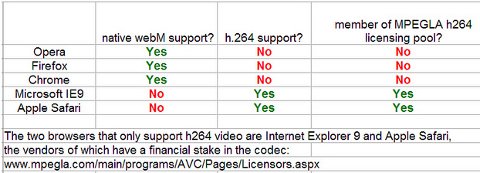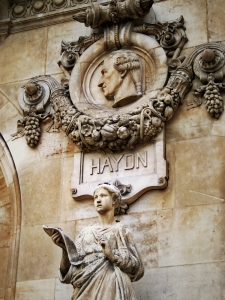01.15.11
Posted in Apple, Microsoft, Patents at 5:29 pm by Dr. Roy Schestowitz
Summary: Microsoft takes its opposition to royalty-free codecs up a notch
AS we routinely emphasise, knowing what’s good for software freedom is an exercise which sometimes involves watching the reactions from freedom opponents such as Apple and Microsoft. Apple’s and Microsoft’s love of the MPEG-LA cartel (at the expense of Ogg and WebM) only makes it more apparent that MPEG-LA, which is headed by a patent troll, empowers proprietary software giants. They can accept patent thickets, whereas small businesses cannot.
Now, watch this picture from Bruce Lawson. Here is a copy (with attribution):

It is self-explanatory, is it not? Here is an article about the backlash which mostly came from Microsoft, using ridiculous analogies in a spin piece. Jan Wildeboer called it “Palinizing use of language by MSFT on Google and #webm #vp8 IMHO.” He asked: “Can we haz civilised discussions, plz?”
Microsoft booster Peter Bright chose the headline “Google’s dropping H.264 from Chrome a step backward for openness” and people can see the responses from LWN. Sag Arun wrote: “Is microsoft is filled with people like http://ur1.ca/2tkos #compares H.264 with english #fail” █
Permalink
 Send this to a friend
Send this to a friend
01.14.11
Posted in Apple, FUD, GNU/Linux, Google, Security at 1:48 am by Dr. Roy Schestowitz
“You are getting very, very sleepy…”

Summary: The latest statements regarding hypeOS [sic] versus Android rely on misinformation
THE STRUGGLING insecurity firm known as Trend Micro has resorted to patent harassment in addition to other dubious activities and according to several reports [1, 2, 3, 4, 5, 6] like this one, “Trend Micro attacks Open Source”:
Insecurity expert Steve Chang, who is the chairman of Trend Micro, has just declared himself the sworn enemy of the Open Sauce movement by saying that Android is less secure than the iPhone because it is Open Sauce.
Chang claims that because Android was open sauce a hacker could understand the underlying architecture and source code and work out new ways to do it over.
Steve Chang said that you had to give credit to Apple, because they are very careful about it. It’s impossible for certain types of viruses to operate on the iPhone.
A rebuttal has been posted, which states that “the open-source-is-less-secure myth was dispelled more than a decade ago. Take a look at Linux, Apache, Firefox, or Chrome — four huge open-source projects, and all many times more secure than their closed-source brethren (Windows, IIS, Internet Explorer). Open source projects are more secure than closed-source projects due to peer and code review, and vested interest! Trend Micro fails to appreciate that while maybe a handful of people have seen the iOS source, thousands have eyeballed Android’s innards to look for bugs. Don’t forget that Android is also based on Linux, which must be one of the most rigorously tested pieces of software ever made.
“Later in the interview, Chang even goes on to mention the iOS sandbox “that isolates the platform”… which Android also has!” █
Permalink
 Send this to a friend
Send this to a friend
Posted in Apple, GPL at 1:21 am by Dr. Roy Schestowitz
Summary: Latest news items regarding VLC, which help show why Apple is malicious
• VLC iOS developers fight back
Apple invited Applidium to contact Rémi Denis-Courmont, directly should it have any further questions relating to the matter. Denis-Courmont had previously told Planet VideoLAN that he thought it likely that VLC was removed because Apple could not abide having software distributed under the GNU General Public License (GPL) in the App Store. It is not clear why so much time elapsed between Denis-Courmont’s complaint being received and the decision to remove the app.
• More Facts Behind Apple’s Removal Of VLC From AppStore
We reported that Apple recently removed a VLC app developed by Applidium from its AppStore. Apple wrote to Applidium that Apple earlier informed them that they received a notice from Rémi Denis-Courmont where Rémi complained that Applidium app infringes on his intellectual property rights.
Applidium claims to have approval from the VideoLAN association before starting the iOS port of VLC. This is a point of interest. Did Applidium had an agreement with VLC about the publication of the app on App Store?
• A Beginner’s Guide To The GPL (see how Apple drones think… or can’t)
It’s clear from the comments on that post that many people don’t understand the GPL concept, or don’t consider adhering to licences particularly important. This remark from Pu Koh is fairly typical:
Was the GPL created to benefit the end user? How is removing the app beneficial to anyone?
• Apple Pulls VLC Player from App Store, Denis-Courmont Defends Self, VideoLAN (personal attacks, as noted the other day)
• Apple Users Forced to Pirate VLC Player? Whatever Next? (Apple absurdity)
Last year, iPhone, iPad and iPod Touch users were delighted to learn that VLC media player had become available for their device via the App Store. But now, thanks to a licensing and copyright dispute, that particular party has been cut short and the software pulled offline. Bizarrely, the only way people can get this free and open source software now is to pirate it. You couldn’t make it up.
Permalink
 Send this to a friend
Send this to a friend
01.13.11
Posted in Apple, Europe, GNU/Linux, Google, Microsoft, Patents, Windows at 12:40 am by Dr. Roy Schestowitz
Co-autor con G. Forbes

(ODF | PDF | English/original)
Resumen: la absurda legislación en Francia es más criticada por la prensa y por enojados bloggers, que ven a Windows obtener un viaje gratis, mientras que somete a su competencia a escandalosos nuevos impuestos.
AL final del mes pasado, escribimos acerca de un desarrollo preocupante en Francia en relación con un “impuesto a los derechos de autor”. Por este impuesto, el gobierno decidió discriminar en favor de Microsoft [http://techrights.org/2010/12/29/microsoft-and-bsa-overlap/], su aplicación a cualquier otra plataforma que no sea Windows. Existe un debate acerca de este notable “impuesto” en muchos lugares, en francés y muchos otros idiomas. Algunos de los artículos mejor que hemos encontrado son:
I. Los franceses Dicen: Si No Es Windows, Debe Haber Sido Pirateado [http://www.againstmonopoly.org/index.php?perm=593056000000004296]
El gobierno francés tiene la intención de golpe un impuesto de 12 euros en cualquier tableta menos las que se vienen con Windows. Uno podría preguntarse por qué Francia QUIERE COMPLACER A MICROSOFT, pero la lógica es al parecer que cualquier cosa que no sea Windows debe ser pirata, y eso incluye Mac OS, Android, e incluso Linux . Lo más extraño es que una empresa francesa, Archos, serían perjudicados EN BENEFICIO DE UNA empresa ESTADOUNIDENSE.
II. Impuesto Que Debe Imponerse a las Tabletas PC Excepto las de Windows [http://frenchtribune.com/teneur/102722-tax-be-imposed-pc-tablets-barring-windows]
Esta segunda dice que el gobierno “de Francia ha estado contemplando en imponer un impuesto de 12 euros a cada tableta PC con más de 40GB de memoria interna, a menos que operan en Windows. En esta forma Microsoft puede obtener la ayuda necesaria en el mercado de Tablet PC. ”
Bueno, tienen que cambiar esto, ya que es indignante.
III. Francia Pondría Impuestos a las Tablet PC – Excepto Aquellos con Windows [http://blog.seattlepi.com/microsoft/archives/233576.asp?from=blog_last3]
Para citar: “¿Por qué el trato especial de Microsoft? Porque a diferencia de los que dirigen iOS de Apple o los sistemas operativo Android de Google, las tabletas de Windows “tienen” todas las características suficientes para contarse como verdaderos ordenadores en lugar de los dispositivos móviles. “Es increíble que en realidad hayan hecho esta conclusión. Esta noticia también está haciendo una aparición en los medios corporativos [http://www.bloomberg.com/news/2010-12-27/microsoft-tablet-aimed-at-fighting-ipad-faces-long-odds-in-vegas.html]. Sin embargo, se olvidan de tomar un enfoque lógico, y la manera en que Microsoft está utilizando legislación escandalosa en su extorsión en lugar de competir (tales sitios corporativos la juegan seguro con los anunciantes – no quieren ofenderlos).
En los próximos días vamos a mostrar una gran cantidad de artículos sobre otros impuestos utilizado en una vena similar contra Android / Linux. Estos incluyen los impuestos relacionados con las patentes (además de los intentos de Microsoft de implementar un Impuesto sobre Android y sobre Linux). Esta situación general del INJUSTO impuesto merece ser calificados de “CORRUPCION” y “COMPLICIDAD” de algunas personas. Nick Farrell ha dicho que “Francia [va] ha traer un impuestos para tabletas no-Windows [http://www.techeye.net/hardware/france-to-bring-in-non-windows-tablet-tax]“. Elabora con humor:
El gobierno francés ha creado un asistente de silbido que parece ser completamente diseñado para respaldar el gigante del software Microsoft.
En una alianza franco-americana, de la talla de los cuales no se ha visto desde que los franceses respaldados por una campaña por parte de terroristas anti-democráticos en contra de su gobierno legítimo, los franceses van a poner impuestos a cada Tableta PC que no venga con el software de Windows a bordo.
La lógica es que si uste está usando Android, Linux o MacOS usted debe ser un pirata, ya que Windows es la herramienta de elección para todos los ciudadanos franceses decentes.
Será interesante ver si esto se retracta de lo que por derecho debe hacerse. En Economía, un buen “impuesto Pigovian” está diseñado para eliminar el efecto económico de una externalidad negativa, por ejemplo la contaminación. Este “impuesto”, que presume la culpa en nombre del comprador, es más una forma de extorsión de una vagamente definida “externalidad” incorrectamente definida como la ‘piratería’ por el cartel de autor y los conglomerados de medios. En este sentido, el impuesto es más o menos un subsidio-de-cualquier-otro nombre a estas organizaciones. Quieren que el gobierno los compense por algo que asumen erróneamente que se merecen. █
Many thanks to Eduardo Landaveri of the Spanish portal of Techrights.
Permalink
 Send this to a friend
Send this to a friend
01.12.11
Posted in Apple, GNU/Linux, Google, Microsoft, Patents, Windows at 4:49 pm by Dr. Roy Schestowitz
Co-authored with G. Forbes

Summary: Absurd lawmaking in France is further slammed by the press and by upset bloggers, who see Windows getting a free ride whilst its competition may be subjected to outrageous new taxes
AT THE END of last month we wrote about a disturbing development in France regarding a ‘copyright tax’. For this tax, the government decided to discriminate in favour of Microsoft, applying it to any platform other than Windows. There is noticeable debate about this ‘tax’ in many places, in French and other languages. Some of the better articles that we found are:
i. The French say: if it is not Windows, it must have been pirated
The French government intends to slap a tax of 12 euros on any tablet unless it runs with Windows. One might wonder why France wants to pander Microsoft, but the logic is apparently that anything that is not Windows must be pirated, and that includes Android, Linux and even MacOS. The most bizarre is that a French company, Archos, would be hurt to the benefit of an American company.
ii. Tax to be imposed on PC tablets barring Windows
This second one says that the “government of France has been contemplating about imposing a tax of 12 Euro on every tablet PCs with over 40GB of internal memory unless they operate on Windows. This way Microsoft can get the much required aid in the tablet market.”
Well, they must change this as it’s outrageous.
iii. France could tax tablet PCs — except those with Windows
To quote: “Why the special treatment of Microsoft? Because unlike those running Apple’s iOS or Google’s Android operating systems, Windows tablets are full-featured enough to count as computers rather than mobile devices.” It’s unbelievable that they would actually make such a conclusion. This news is also making an appearance in the corporate media. However, they neglect to take a logical approach and state that Microsoft is using outrageous legislation and extortion rather than competing (such corporate sites play it safe with advertisers).
In the coming days we will be showing a lot of articles about other taxes used in a similar vein against Android/Linux. These include patent-related taxes (in addition to Microsoft’s attempts to implement an Android/Linux tax). This overall unfair tax situation is being labelled “corruption” and “collusion” by some people. Nick Farrell has said that “France [is]to bring in non-Windows tablet tax”. He humourously elaborates:
The French government has come up with a wizard wheeze which seems to be entirely designed to back the software giant Microsoft.
In a Franco-American alliance, the likes of which has not been seen since the French backed a campaign by anti-democratic terrorists against its lawful government, the French are going to tax every tablet which does not come out with Windows software on-board.
The logic is that if you are running Android, Linux or the MacOS you must be a pirate as Windows is the tool of choice for all decent minded French citizens.
It will be interesting to see if this gets retracted as it rightfully should be. In Economics, a proper “Pigovian tax” is designed to eliminate the economic effect of a negative externality, for example pollution. This ‘tax’, which presumes guilt on the buyer’s behalf, is more a form of extortion of a vaguely-defined “externality” inaccurately defined as ‘piracy’ by the copyright cartel and media conglomerates. In this light, the tax is more-or-less a subsidy-by-any-other-name to these organisations. They want government to compensate them for something they falsely assume they deserve. █
Permalink
 Send this to a friend
Send this to a friend
Posted in Apple, DRM at 11:29 am by Dr. Roy Schestowitz
Co-authored with G. Forbes

Summary: Apple has failed to save the old (antiquated) newspaper industry, but Murdoch and Jobs to consider other plans
WE HAVE BEEN sceptical of the hypePad since it was first announced in 2010. We argued that die-hard fans of Apple would have shallow interest in the product. This kind of interest frequently dies out after purchase; those who choose accessories over practical value would just get bored with the hypePad.
As expected, the primary function of this DRM-laden gadget is starting to disappoint and hypePad magazine sales are slumping. It turns out that Steve Jobs is “not the saviour of journalism” that some were hoping for him to be, alleges this one report:
It verily could according to this article by WWD.com. Statistics from the Audit Bureau of Circulations reveal that by the end of 2010 – which is just two days away now – magazine sales on the iPad were seriously drooping.
Apple is good at reinventing the wheel and charging more for it, often without the level of quality expected with a higher price. As one article put it, “[e]ditorials began asking if the iPad might be the saviour of an industry in a seemingly terminal decline.” It was “just wishful thinking,” Glyn Moody explained over at Identica.
Perhaps Jobs should reconsider his upcoming liaison with Murdoch. It does not seem to be a very smart PR strategy with all the troubles mentioned above.█
Permalink
 Send this to a friend
Send this to a friend
01.11.11
Posted in Apple, Free/Libre Software, FSF, GPL at 3:10 pm by Dr. Roy Schestowitz
Co-authored with G. Forbes

Summary: Developers can learn how Apple harms software producers, by acting as a draconian gateway that separates users from producers
MIDDLEMEN are prevalent in the world of copyrighted video and audio, but what about software? Apple is trying to do to hackers and organised businesses that sell software or services exactly the type of thing media conglomerates do to creative artists and so-called ‘pirates’. Should we step aside and allow this to happen? It’s no longer just the mobile platform of Apple that does this; Microsoft too has similar plans.
The VLC story was mentioned here earlier as the old GPL/VLC saga carries on (Apple has contested the GNU GPL).
The news of Apple’s banning of VLC media player from its “App” Store has produced a large amount of response (Steven J. Vaughan-Nichols’ response is noteworthy). A large majority of it is predictable, trying to paint the GPL, R. Denis-Courmont, and practically anyone but Apple as the problem here. Jason Perlow is known for his frequent hostility towards the FSF and he previously wrote on the subject of the FSF’s relationship with the Apple App Store (or others). With regards to the VLC removal, he pushed an argument that the GPL’s complexity is what is at fault here. He supposedly explains “[h]ow to avoid public GPL floggings on Apple’s App Store”:
It is often said that no good deed goes unpunished. Unfortunately even with the best of intents, particularly as it relates to releasing Open Source Software, it is possible to run far afield of GPL and FOSS kashruth even if you think you are following the rules to the best of your ability.
It’s humourous to see him describe GPL compliance as some sort of minefield when Apple’s App Store developer agreement is needlessly complex, and apps can be removed at will, such as the censorship target of the day (the Wikileaks app [1, 2, 3]). By contrast, the GPL violation issue here can be put rather simply:
The difference in the two policies was flagged up to Apple by Rémi Denis-Courmont, one of the original developers of VLC. The GNU license would allow Apple to distribute the iOS version of VLC, but not to apply DRM to it; as has been the case with previous GNU-licensed apps, Apple has chosen to pull it from the App Store rather than amend their DRM policy.
See this article too:
VLC was a surprise addition to the App Store back in September, but one which iPad and iPhone users quickly came to appreciate. Now the multi-format media player has been yanked from the store, the result of incompatibilities with Apple’s App Store DRM policies and the terms of the GNU General Public License on which VLC is based.
Other articles ignore this plain fact and instead resort to idle speculation. One article even attempted to suggest that Denis-Courmont was influenced by his occupation at Nokia:
Rather, it’s a direct result of one man’s misguided crusade… a man who, (perhaps) coincidentally, is an employee of Nokia, one of Apple’s competitors in the mobile space.
Of course, the flaws with the assumption are numerous. VLC is still available for Android, an operating system which Nokia doesn’t utilize but many of its competitors do. Furthermore, VLC has been ported to other proprietary operating systems including OS X. Of course, if Apple amended its App Store policy to allow GPL software, then Denis-Courmont would not have a reason to protest the inclusion of VLC.
Of course, VLC isn’t the only software under the GPL which has had conflicts the restrictive App Store policy:
Before I give a status update on the iPhone issue, let’s get a refresher course on why this project exists in the first place. For years, Windows and Mac users have completely ignored their Linux gaming brethren. Linux users have spent countless hours trying to get the official Ventrilo program working under Linux with various levels of success. If the users of Ventrilo had decided to care in the slightest about cross-platform voice communications programs, they would have switched to Mumble (BSD licensed)… or even Teamspeak (which has Linux support, even if it is crappy).
Anyhow, Luigi Auriemma wrote a GPL implementation of the the Ventrilo call-home and encryption algorithm which is required for any implementation of the Ventrilo protocol. That code was the basis for the beginning of Spux (which, by necessity was GPL) by Michael Sierks and Cris Favero, which helped spawn the development of our little project here. Even if Luigi’s code hadn’t been GPL, we would have licensed our app as GPL anyway… but either way, we’re obligated to use the same license for our work.
For the most part, Pro-Apple Web sites mostly refrain from criticising Apple. VLC developers on the other hand explain this situation as follows: “First, even I do not know for certain why Apple removed VLC, and Apple will probably never state the truth.
“Second, Apple has already removed VLC from the “old” Mac Store for computers… already about 4 years ago, at a time when VLC was one of the most popular applications, and I am yet to learn the reasons why.
“Third, Apple received my copyright notification more than 2 months before they pulled the application. This was not expedited, as the US copyright law would require. As such, it seems dubious that my well-publicized notification from last october is the root cause of the removal. It is nevertheless the reason why I was learnt directly from Apple that VLC was removed.
“Last, Apple had the power and plenty of time (2 months) to adjust and clarifiy the terms of the App Store. Indeed, said terms were modified several times since then…”
Meanwhile it turns out that “Pirate Bay Founder Says Apple “Becoming Microsoft” with Mac App Store,” to echo the headline of another pro-Apple Web site:
The million people who downloaded Apple’s Mac Store yesterday are turning themselves into PCs, says Pirate Bay co-founder Peter Sunde.
“Apple is going on the path to control computer use,” he told Forbes via e-mail, adding that Steve Jobs’ company is “forcing you to use their App Store to get programs.”
Whether you think the Mac App store makes Apple more like Microsoft or not, the confusion generated by the first iteration of the store – our post on what happens when you try to install apps you already have reads like something out of a Windows joke book – is definitely un-Apple like.
Sunde, who is facing jail time and a $700,000 fine after unsuccessfully fighting charges of encouraging copyright infringement by helping set up Pirate Bay, reportedly hit “delete” when a software update automatically installed the App Store on his Mac.
Apple is increasingly being associated with unjust control. Developers and users alike should pay attention to these attitudinal issues. █
Permalink
 Send this to a friend
Send this to a friend
01.10.11
Posted in Apple, Free/Libre Software at 2:02 am by Dr. Roy Schestowitz
Apple Still Hates the GPL

Source of original photo
Summary: Disdain and fear of Free software is shown as Apple stifles its #1 competition (which is already uses software patents against) by banning it from the “App Store”
APPLE IS not compatible with the GNU GPL and this has already led to problems with VLC. Well, Apple does it again as it “pulls VLC from App Store over open-source DRM dispute”:
VLC was a surprise addition to the App Store back in September, but one which iPad and iPhone users quickly came to appreciate. Now the multi-format media player has been yanked from the store, the result of incompatibilities with Apple’s App Store DRM policies and the terms of the GNU General Public License on which VLC is based.
As one developer (not of VLC) views it, “[t]he problem with the Apple store today is that when you downloaded an application from it, you do not have freedom 3. I assume that R. Denis-Courmont (a VLC contributor and less importantly a Nokia employee) tries to change the Apple store to a more transparent system by telling them they infringed on the GPL with their VLC app and they should allow copying applications from one phone to another when they are licensed under the GPL. Instead of Apple adding 2 lines of code to their system which would allow people who downloaded GPL apps to copy those from one isomething to another isomething, they seem to have removed the VLC app from their store which resulted in irrelevant reactions, annoyed users and frustrated contributors.”
Apple is bad for everyone’s freedom. It doesn’t even hide it. █
Permalink
 Send this to a friend
Send this to a friend
« Previous Page — « Previous entries « Previous Page · Next Page » Next entries » — Next Page »























 Content is available under CC-BY-SA
Content is available under CC-BY-SA